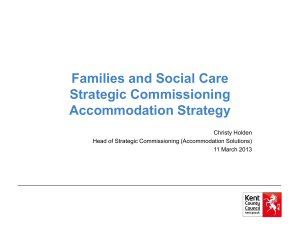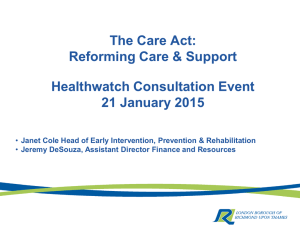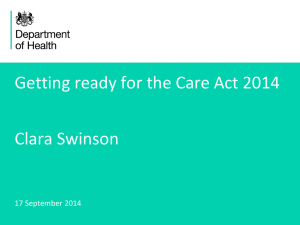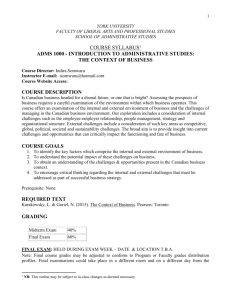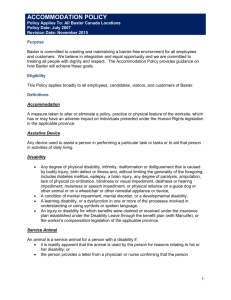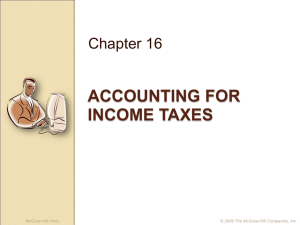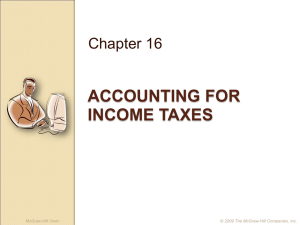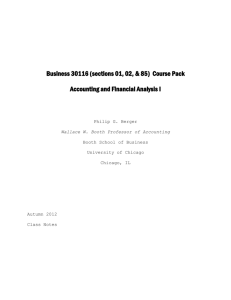The Care Act 2014 - Presentation by Marie
advertisement
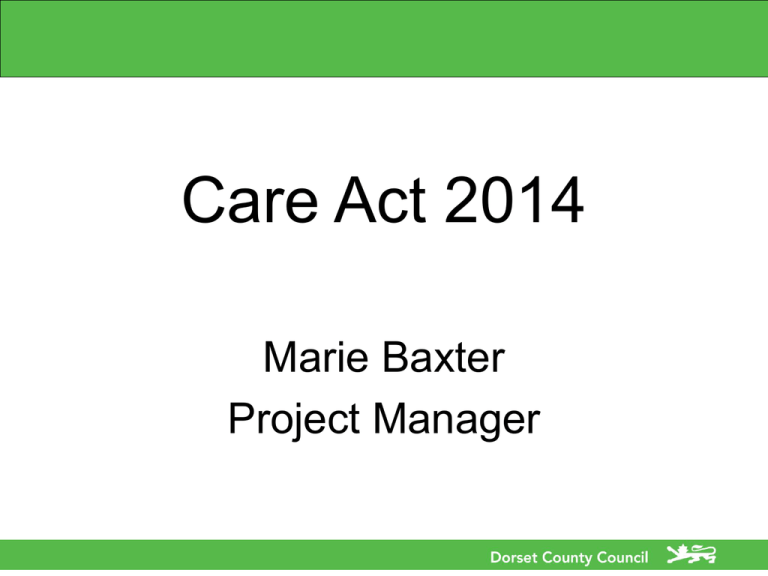
Care Act 2014 Marie Baxter Project Manager Care Act 2014 What is the Care Act 2014? What does the Care Act mean to me, my organisation, the population of Dorset ? How do I participate in the consultation on regulations and guidance? Delivering the Government’s Vision for Adult Social Care What does the Care Act do? • Consolidates 60 years of legislation for adult social care in England and current good practice, into a single framework, • Introduces reforms to the way care and support is accessed and funded. • Reforms to the regulation of health services and care standards, and will establish Health Education England (HEE) and the Health Research Authority (HRA). The Care Act: built around people • ensures that people’s well-being, and the outcomes which matter to them, will be at the heart of every decision that is made; • puts carers on the same footing as those they care for; • creates a new focus on preventing and delaying needs for care and support, rather than only intervening at crisis point, and building on the strengths in the community; • embeds rights to choice, through care plans and personal budgets, and ensuring a range of high quality services are available locally. The Care Act: built around people • supports people with information, advice and advocacy to understand their rights and responsibilities, access care when they need it, and plan for their future needs; • provides for a single national threshold for eligibility to care and support; • extends financial support to those who need it most, and introduces a cap on the care costs that people will incur. • deferred payments scheme; • gives new guarantees to ensure continuity of care when people move between areas, to remove the fear that people will be left without the care they need; • includes new protections to ensure that no one goes without care if their provider fails, regardless of who pays for their care. The Care Act and housing • The suitability of living accommodation is now explicitly listed as part of the definition of wellbeing a fundamental principle of the Act • Housing is now explicitly referenced as part of local authorities’ duty to promote the integration of health and care. • Registered providers of social housing are now explicitly listed as one of the partners when considering and planning a person’s need for care and support • Housing and housing scenarios feature strongly in guidance Dorset Implementation match with developments Timeline for Implementation •14 May 2014 Care Act became law. •June 2014 -draft Regulations and Guidance issued •15 August 2014 closing date for consultation on care elements •Autumn 2014 - consultation on funding reform •Intensive communication period national and local •April 2015 - Care elements in force •April 2016 - Funding reforms in force Draft regulations issued; •Assessment •Eligibility Criteria •Independent Advocacy •Charging and Assessment of Resources •Preventing Needs for Care and Support •Aftercare (Choice of Accommodation) •Deferred Payment •Personal Budget Exclusion of Costs •Direct Payments •Provision of Health Services Discharge of Hospital Patients Children’s Carers •Ordinary Residence-Specified Accommodation •Ordinary Residence •Continuity of Care •Provider Failure •Market Oversight Criteria •Market Oversight Information •Cross-border Placements •Business Failure Duties •Registers •NHS Licence Exemptions, etc. Amendment The guidance: chapter by chapter Ch Topic Ch Topic 1 Promoting wellbeing 12 Direct payments 2 Preventing, reducing or delaying needs 13 Review of care and support plans 3 Information and advice 14 Safeguarding 4 Market shaping and commissioning 15 Integration, cooperation and partnerships 5 Managing provider failure 16 Transition to adult care and support 6 Assessment and eligibility 17 Prisons and approved premises 7 Independent advocacy 18 Delegation of local authority functions 8 Charging and financial assessment 19 Ordinary residence 9 Deferred payment agreements 20 Continuity of care 10 Care and support planning 21 Cross-border placements 11 Personal budgets 22 Sight registers 23 Transition to the new legal framework Areas with related draft regulations Examples of Consultation Questions Integration and partnership working 53. Could local authorities’ duties in relation to housing be described more clearly in the guidance? 55. How could guidance on the legal boundary between care and support and general housing responsibilities be improved? 56. Are there any good practice examples of local authorities working with their partners, including health, education, employment and housing? 48. Are there any ways the guidance can better support cooperation locally? Deferred payment agreements 30. Should the eligibility criteria for deferred payment agreements be extended to include people in extra care housing or supported living arrangements? Do you have evidence of the likely demand for deferred payment agreements from people whose needs are met in these types of accommodation? Choice of accommodation and additional payments 27.Does the guidance need to particularly cover these (such as Shared Lives and Extra Care Housing) types of accommodation? If so, what would it be helpful to discuss? Where can I access information, documents and Department of Health consultation ? The department web pages for views on the draft regulations and guidance for Part 1 of the 2014 Care Act; https://www.gov.uk/government/news/care-act-2014-launch-ofcare-and-support-consultation Quick read factsheets on aspects of the Care Act at https://www.gov.uk/government/publications/care-act-2014-part-1factsheets parliamentary website http://services.parliament.uk/bills/201314/care.html www.dorsetforyou.com Your Dorset, local and national media local Care Act 2014 queries, comments and suggestions to; Marie Baxter Project manager : m.baxter@dorsetcc.gov.uk https://www.gov.uk/government/news/care-act-2014-launchof-care-and-support-consultation


